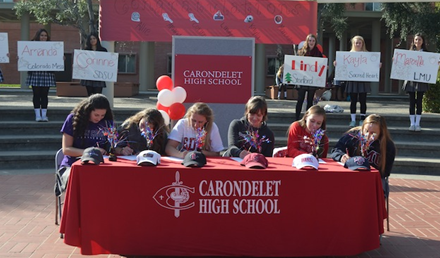
By Clay Kallam
A lot of people are giving me advice about where to go to college. I’d like to play soccer, but I don’t really know how good I am. Some people say I can play Div. I, and one of my coaches said I might have a better college experience if I go Div. III. But the schools I really want to go to are so good in soccer I probably couldn’t play there. So I’m really confused, and people keep talking to me and confusing me even more. Who should I listen to?
G.G., Berkeley
It’s sort of ironic you’re asking me for advice on which advice to take, but that’s really the crux of the issue, for you and almost everyone heading off to college: You want to make the best decision possible so you talk to as many people as possible, but after a while, it’s easy to fall into the paralysis-from-analysis trap — but then again, maybe the next person you talk to will give you the key to unlocking the best decision.
At some point, though, you have to draw a line in the sand and say to yourself “OK, I have to move from information-gathering to decision-making.”
That’s step one. Step two is to evaluate who’s giving you advice and why. Generally, your parents have certain goals for you, and obviously you should listen to them. But, as you assuredly have pointed out to them in the past, you are not them, and their goals aren’t necessarily yours.
Your club soccer coach makes his living from soccer, and the more players he sends on to Pac-12 schools, the better his club looks — and the more likely he is to make more money. So his assurance that you’ll do fine at UCLA is great, and may even be accurate, but there is an advantage for him even if you go to UCLA and quit playing after one year. He can still say he sent a player to the Pac-12.
Your soccer friends and their families are all wrapped up in the same complications, but there’s also an added level of competition. One girl and her dad are bragging about how she got a ride to Texas Tech, and a boy claims he got into a really good academic school because of the soccer coach.
All of this leads to the moment when you want to decide where to go to school, and at that moment, you are taking another step, a big one, towards adulthood. In the end, the only advice that matters is your own, and you have to filter out, as best you can, all those other voices.
How important is soccer? How important will soccer be two years from now? Four years from now? Twenty years from now? Will you look back if you wind up not playing in college and always wonder “What if …,” or will you feel that your time was better spent on preparing for a business career? Or is the fact that you can only play soccer at this level for a few more years and you’ll be working the rest of your life more important?
One of the reasons we enjoy sports is that there’s always a clear outcome (even a tie), but life is much more ambiguous. You can never really know what the best decision is or was, so you just have to do the best you can at the moment you decide, and then move on.
Of course, that’s just my advice, and maybe my voice is one you should filter out.
Or not. Good luck.
Clay Kallam has been an assistant athletic director and coached numerous sports at a handful of high schools throughout the Bay Area. His Behind the Clipboard Q&A Column is a SportStars Magazine monthly feature. Got a question? Email him at claykallam@gmail.com.
For more columns and local sports coverage, visit SportStarsMag.com.


Unless you are professional bound for soccer, I’d concentrate on the academics instead of the sports and choose a school that would give you a solid education that you could rely on the rest of your life. Major in something with substance (physical sciences, math, etc.) versus easy courses to just graduate and take cost of your education and expected salary afterwards into consideration before making a decision. Good luck!!
Tune in: establishing as much connection as possible because it is really easy to get a job that way.
Tune out: unless you want to be a professional (doctor, lawyer, ect) your career is not related to your major.
Go to college for the “Sports?” I’m trying to remember where Pele’ went to college… It escapes me.
Is Dad a lawyer? Your plumber probably makes more money than Dad. Is Mom a school teacher? The two men who take care of your lawn probably each make more than she.
Maybe rethinking goals is more appropriate than thinking about goalies.
So, if I want to make lots of money I should be a plumber, or a gardener? 🤪
If I had the chance to go back in time and had played sports at a young age, and it was my passion, I would speak to others who played the same sports, and are now happy, well adjusted adults.
Good luck to you, and always be thoughtful and grateful.
Not to downplay plumbers or landscapre professionals, but college is definety the way to go nowadays. Studies are everywhere that show college graduates make more money overall and typically have more secure jobs. I encourage you to move on to college right out of high school. However, sports are sports. I agree with caskydiver above. If you are going to spend the money for a college education, make sure your positioning yourself well to benefit from it. Definetly take part in college sports, but not bet your future on them.
I get what you are saying, but not everything is about money.Maybe the kid has no interest in the trades or doesn’t want a physically demanding job (this is especially a concern as you get older in life). There is also much more movement in careers with a college education.College is about making connections, refining critical thinking skills (this is this most important skill you will earn), and gaining knowledge.
I have nothing against the trades and respect those that are in it. However, we shouldn’t be discouraging kids to go to college either. What we should be doing is fighting to make college affordable. We should also be heavily pushing for kids that may not know what they want to do yet to go to community colleges. They have great programs there for any path you may decide to take. The community college system needs to go back to being tuition free.
Santa Clara has a great soccer and academic program. I went to a soccer camp there as a young teen and we got to stay in the dorms for a weekend and eat in the cafeterias and go to the college rec rooms it was a great experience
When deciding which college to attend after high school, just remember that your going to study there as an undergrad. It doesn’t make sense to undergrad at a brand school, i.e. Stanford, Harvard, Berkeley because the accomplishment is common. However it’s more impressive to do graduate studies in a brand school.
If you are are good enough to make a college soccer team register with the NCCA College Clearing House and see what college would be interested in offering a scholarship. That might give you more options in selecting a college no matter if it’s a Div. I or III. You can do both, go to college for a good education and play sports. Keep all your options open!
Until the virus is truly knocked down, fear will keep the smartest away from crowded settings like schools, sports events, big box stores, & etc.
With upwards of 40% of newly infected being from healthy appearing, asymptomatic shedders, the old models just don’t work anymore.
Forget all these haters. Make your college decisions based on sports. UC Berkeley is famous for football, not physics. Prospective employers are not going to care about your academic career, all they’re going to want to hear about are your on field exploits. There is a reason coaches get paid way more than professors. Sports are the purpose of college. All that other stuff is just the asparagus you have to eat so you can have the butter cream layer cake we call sports.
I have to assume that the above was said with tongue firmly planted in cheek. Coaches are paid more than professors because the university makes money from sports. BTW, Berkeley IS famous for physics.
The purpose of college is to learn things, the most important IMHO is how to think and solve problems. Life and career are a series of word problems and the most successful are those who do the best at solving those problems. The reality is that most professional athletic careers are very short and you need skills after your athletic career is over. Also, most college athletes don’t even make it into professional sports. Playing a sport is great, but should be done for the love of the sport. You should choose a college that is a good academic fit for you. If sports are important, put that into the equation, but it should not be the primary determinant.
I say this as the father of 3 daughters who graduated from Carondelet (and two sons who are DLS graduates). All 5 went to college (3 to UC, two to CSU), one of whom got a masters degree from Berkeley.
Call anyone in Syria and discuss your difficulty with them. Meditate and channel an ancestor from 1000 years ago, who toiled in the fields and died at age 32, so you could go to college one day, and base your decision on soccer. Follow a Uyghur slave being held in China making products for Nike, Apple, BMW, etc on the Gram, and ask his followers who you should talk to about the importance of the college experience. Maybe ask a war veteran who at 18 grabbed a gun, went to war, and came back without a leg about getting advice from too many friends.
For God’s sake, talk it over with your parents and show them some respect for them making decisions that have kept you out of harm’s way. Someday those decisions will be yours to make, and it all starts now. Grow up already. Please cupcake?
My daughter has a picture similar to the one above from only a few years ago,. She played for Carondelet and was good enough to follow her passion. It is a difficult decision to quit playing a sport you have done probably most of your life. We know of several that quit to focus on college but shortly after cane to regret that decision, others have happily moved on. Due to competing in dozens of junior tournaments mostly in California she got to know several of her competitors and they all came to the same point you are. My daughter chose Division 1 but others that, in my opinion, were marginally better than her chose Division III. Much of what others have already said is true about education and post college endeavors. For her she feels competing at a Division 1 level, experiencing the NCAA rigors for Division ! athletes yet getting all the perks the athletes get was phenomenal, rewarding and an accomplishment. She wanted the big school atmosphere (35,000 students) rather than the small campus (2,500) coziness.She is now following her passion into the medical field.